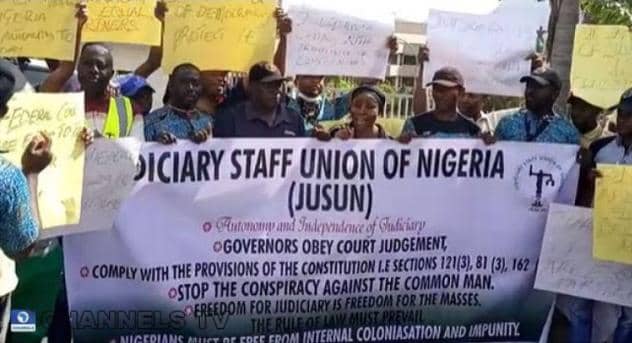Members of the Judiciary Staff Union of Nigeria (JUSUN) on Monday launched a nationwide strike.
The protest is aimed at pressuring the government to implement the revised national minimum wage and effect a general salary increase.
Diaspora Digital Media (DDM) reports that the strike has crippled judicial operations across the country.
A circular dated May 30, issued by Acting National Secretary M. J. Akwashiki, instructed all state chapters to down tools starting from midnight, June 1.
The instruction was fully obeyed in many states, leading to empty courtrooms, locked gates, and frustrated legal practitioners.
In Lagos, JUSUN officials physically turned away judiciary staff, lawyers, litigants, and journalists from the Federal High Court premises.
Even court food vendors were asked to pack up and vacate the premises.
A similar scenario played out in Ibadan, where access was denied to the Federal High Court, Court of Appeal, and National Industrial Court.
One JUSUN official in Ibadan, speaking anonymously, lamented the worsening economic hardship and stagnant wages.
He said court staff were struggling to survive and felt abandoned by the judicial leadership.
Despite repeated appeals and peaceful negotiations, their demands have not been met, he added.
In Benin, the Edo State capital, the strike also grounded activities at the Federal High Court.
Court workers stayed away while some staff who showed up were sent back home by union officials.
Most judiciary workers refused to comment on the strike’s future or when they would return to work.
In Abuja, several courts including the Court of Appeal and FCT High Courts in Maitama, Garki, Wuse Zone II, and Nyanya were completely locked down.
FCT JUSUN Chairman, Abdulrazaq Yusuf, confirmed that the strike was in full effect in all the affected courts.
Court offices and halls were locked, with no judicial activity taking place.
However, the Supreme Court in Abuja continued sitting, and administrative offices were open.
The National Judicial Council (NJC) was also unaffected by the strike.
This non-participation raised eyebrows, prompting questions about internal union coordination.
JUSUN National President Marwan Adamu addressed the issue, denying any rift within the union’s leadership.
He stressed that the strike was a collective decision and all chapters were expected to comply.
When questioned about the Supreme Court and NJC’s exemption, he deferred to their respective union branches.
Adamu insisted the directive was clear and binding on all judiciary workers.
The strike has highlighted deepening frustration among non-judicial court workers who feel marginalized.
While judges continue to receive full privileges, lower-level staff say they are left to bear the brunt of inflation and rising living costs.
Legal practitioners across the country have expressed concern over the disruption caused by the strike.
Many say the industrial action, while justified, will delay justice delivery and cause further backlog in pending cases.
There are growing calls for the federal government to meet JUSUN’s demands to avert a prolonged judicial shutdown.
The Nigerian Bar Association (NBA) has yet to issue an official statement on the ongoing industrial action.
The strike is the second major protest by judiciary workers since 2021 when JUSUN embarked on a similar action demanding financial autonomy.
That protest, which lasted over two months, caused massive delays in court proceedings nationwide.
The present strike may trigger similar effects unless quickly addressed by relevant government agencies.
Observers say the strike could test the government’s commitment to labour welfare and institutional reforms.
As of Tuesday morning, no court-related government body has issued a formal response to JUSUN’s demands.
Meanwhile, court users, including detainees awaiting trial, are the ones most affected by the halt in court activities.
Civil society organizations have urged the government to act swiftly to avoid further damage to the justice system.
DDM will continue to monitor the situation and provide updates as events unfold.







